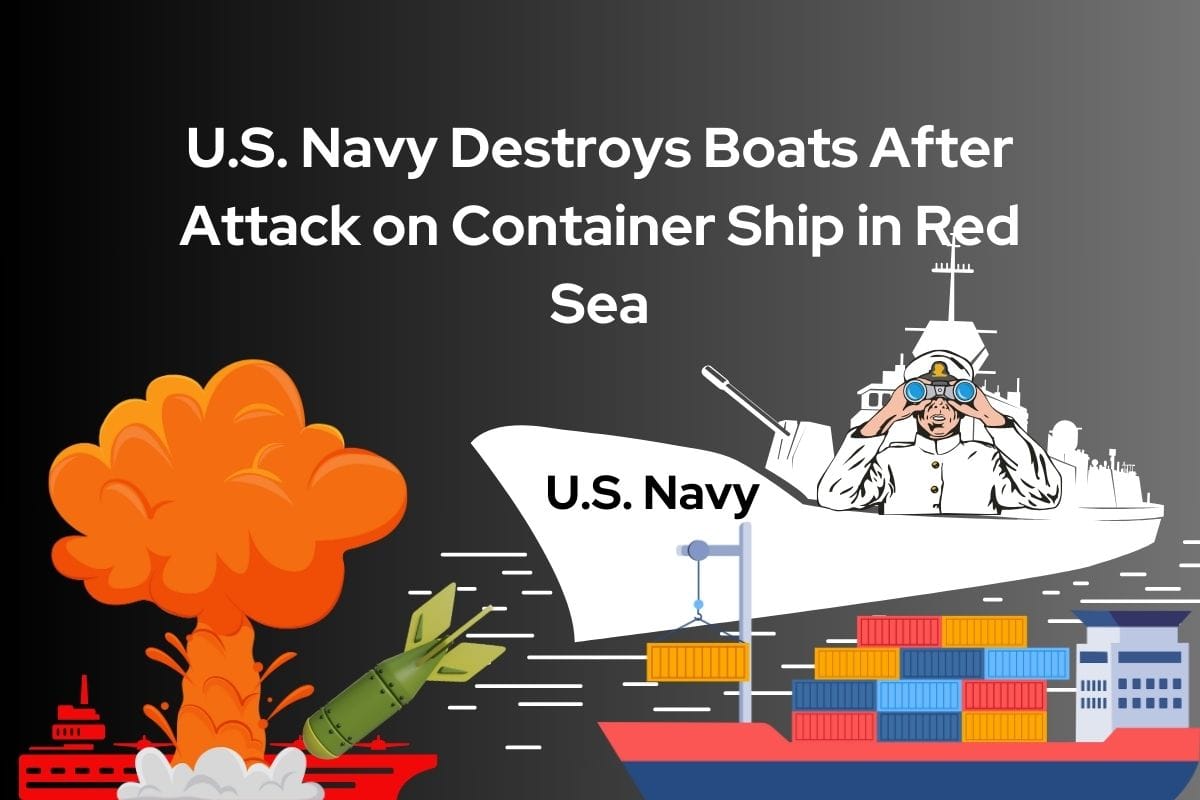
U.S. Navy takes action against pro-Iranian Yemeni rebels attacking a Danish-owned container ship.
Key Points
- Three boats controlled by Houthi rebels were destroyed in response to the assault.
- The attack is part of a series disrupting maritime traffic in the Red Sea.
- More than 20 attacks by Houthi rebels on commercial vessels since November.
- Iranian-backed groups target Western interests in response to U.S. support for Israel.
- Indian navy dispatches guided-missile destroyers for commercial vessel protection in the Arabian Sea.
- Israel supports an international coalition for waterway protection but vows to safeguard its citizens and economy.
- Main Issue:
- The main issue revolves around the U.S. Navy’s response to attacks by pro-Iranian Yemeni rebels on commercial vessels in the Red Sea, with broader implications for maritime security in the region.
News
A U.S. Navy vessel took action against three boats controlled by pro-Iranian Yemeni rebels after they attacked a Danish-owned container ship in the Red Sea. The assault is part of a series of attacks disrupting maritime traffic, with more than 20 incidents reported since November. Iranian-backed groups, responding to U.S. support for Israel, have expanded their attacks beyond targeting Israeli shipping activities. In response to the escalating threat, the Indian navy dispatched guided-missile destroyers for commercial vessel protection, while Israel supports an international coalition for waterway protection.
Geopolitical Tensions Between US And Iran
Tensions between Iran and the United States have been rooted in various geopolitical issues. Here are some key points contributing to the geopolitical tension:
1. Nuclear Deal (JCPOA): The Joint Comprehensive Plan of Action (JCPOA), commonly known as the Iran Nuclear Deal, was an agreement between Iran and several world powers, including the U.S., reached in 2015. However, in 2018, the U.S. under the Trump administration unilaterally withdrew from the deal, expressing concerns about its effectiveness in curbing Iran’s nuclear program. This move escalated tensions between the two nations.
2. Economic Sanctions: Following the U.S. withdrawal from the JCPOA, the Trump administration reimposed and intensified economic sanctions on Iran. These sanctions targeted various sectors, including Iran’s oil industry and financial institutions, significantly impacting the Iranian economy.
3. Regional Influence: Iran and the U.S. have divergent interests and influence in the Middle East. Their involvement in conflicts in countries such as Syria, Iraq, and Yemen has contributed to regional tensions. The U.S. has expressed concerns about Iran’s support for proxy groups and militias in the region.
4. Military Confrontations: There have been incidents in the Persian Gulf involving U.S. and Iranian military forces. Tensions have occasionally escalated due to maritime incidents, including seizures of oil tankers and confrontations between naval vessels.
5. Assassination of Qasem Soleimani: In January 2020, the U.S. conducted a drone strike in Baghdad, Iraq, targeting and killing Qasem Soleimani, a top Iranian military commander. The assassination further heightened tensions and led to an increase in anti-American sentiments in the region.
6. Changing Administrations: The change in U.S. administrations from Trump to Biden has introduced a shift in approach. The Biden administration has expressed a willingness to re engage with Iran diplomatically and explore the possibility of returning to the JCPOA. However, negotiations have faced challenges, and both sides have sought reciprocal steps from the other.
Geopolitical Tensions Between Iran And Israel
Here are some key points contributing to the geopolitical tensions between Iran and Israel:
1. Nuclear Concerns: Iran’s nuclear program has been a significant source of concern for Israel. Israel has been vocal about its opposition to Iran’s nuclear activities, expressing worries about the potential for Iran to develop nuclear weapons. The Israeli government has called for international efforts to curb Iran’s nuclear ambitions.
2. Regional Proxy Conflicts: Both Iran and Israel have been involved in supporting opposing factions in various regional conflicts. For example, in Syria, Iran has supported the Syrian government, while Israel has expressed concerns about Iran’s military presence near its northern borders. The ongoing conflict in Syria has added a layer of regional rivalry between the two nations.
3. Support for Militant Groups: Israel has accused Iran of supporting and arming militant groups such as Hezbollah in Lebanon and Hamas in the Gaza Strip. The Israeli government perceives these groups as direct threats to its security, and Iran’s alleged involvement has contributed to heightened tensions.
4. Ideological Differences: Iran and Israel hold divergent political and ideological stances. Iran’s government has been critical of Israel, questioning its legitimacy and expressing support for the Palestinian cause. Israel, in turn, views Iran’s rhetoric and actions as a threat to its existence.
5. Cyber Warfare: Both Iran and Israel have been involved in cyber warfare activities, with reports of each side targeting the other’s infrastructure. Cybersecurity concerns and accusations of cyberattacks have added a dimension to the ongoing tensions.
6. Assassination of Nuclear Scientists: There have been incidents of targeted assassinations of Iranian nuclear scientists, which Iran has blamed on Israel. These incidents have further fueled animosity and suspicion between the two nations.
7. U.S. Involvement: The relationship between the U.S. and Iran, as well as the U.S. and Israel, plays a significant role in the dynamics of the region. Changes in U.S. administrations and their respective policies toward Iran and Israel have the potential to impact the regional geopolitical landscape.
Important Questions for Exams:
- What is the significance of Iranian-backed groups targeting commercial vessels in the Red Sea?
- How are other nations, such as India and Israel, responding to the escalating maritime security threat in the Red Sea?
- What challenges does the international community face in forming a coalition to protect waterways in the face of escalating conflicts between the USA, Iran, and Israel?



Leave a Reply